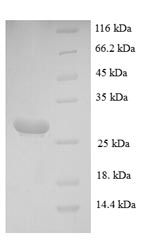The preparation of Recombinant Mouse Mcpt4 protein included 3 main steps: construct the expression vector, expression of protein of interest, and protein purification. Every step was performed under a strict QC system so that we got the premium protein. This Mcpt4 was expressed in E.coli at and fused with N-terminal 6xHis tag. According to SDS-PAGE, the purity turns out to be 90%+.
Mcpt4 is the chymase mouse mast cell protease 4. MCPT4-deficient mice had worsened kidney function compared to wildtype mice. MCPT4 absence exacerbated pathologic neutrophil infiltration in the kidney and increased kidney myeloperoxidase expression, cell death and necrosis. Besides, studies revealed that MCPT4 Chymase Promote Renal Impairment after partial ureteral obstruction. Among the murine chymases, MCPT4 is most likely the functional counterpart of the unique human chymase because it has similar substrate specificity, tissue distribution, proteoglycan-binding properties, and ability to convert angiotensin (Ang) I into Ang II. A study found that mast cell can significantly contribute to the development of UPJ pathology. This action is at least partially mediated by released MCPT4 chymase.






